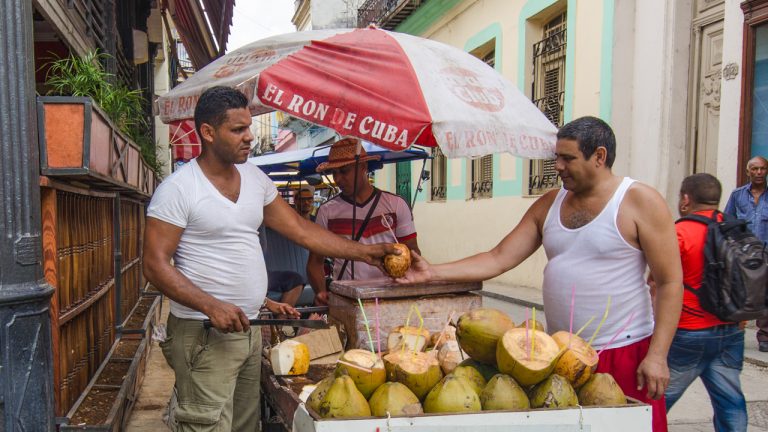
2020-7-6 21:45 |
The Nation of Cuba is dealing with a national food crisis, as Venezuela has stopped offering aid to the small island nation. Moreover, the coronavirus outbreak has caused a shortage of cash couriers called “mules” and everyday items are becoming scarcer. Amid the crisis, a number of Cubans are resorting to leveraging cryptocurrencies like bitcoin to curb inflationary pressure, and the country’s first peer-to-peer bitcoin exchange Qbita launched last April.
The Covid-19 pandemic has ravaged the Cuban economy just like it has throughout the globe. However, Cuba has been hit much harder because of the country’s socialist regime. Cuba is located in the northern Caribbean region and the state adheres to Communism and central planning. This gives the government an authoritarian position over the entire Cuban work force and the country’s means of production.
Leadership is quite tricky in Cuba, as Miguel Díaz-Canel is the President of the nation, but the people follow the rule of Raúl Castro’s guidelines. Raúl Castro is the official first secretary of the Communist Party of Cuba, and to this day, the first secretary is the most powerful leader in Cuba.
The post-Covid-19 economy in Cuba is not looking good as Venezuela has stopped offering the island nation support. The Cuban Communist Party has told all Cubans to start growing food in every empty space they own. The country also is suffering from the lack of “Mules” or “Mulas” who deliver cash and products to the island from other countries.The country’s dealings with the coronavirus outbreak caused the island significant hardship and just recently, Venezuela has stopped offering the country assistance. The Venezuelan government used to be a lifeline for Cubans when it came to financial assistance.
The lack of help from Venezuela invoked the Communist Party to tell all Cuban residents to grow as much food as they can in order to survive. “Cuba can and must develop its program of municipal self-sustainability definitively and with urgency, in the face of the obsessive and tightened U.S. blockade and the food crisis COVID-19 will leave,” José Ramón Machado Ventura, deputy leader of the Cuban Communist Party, recently told the media.
This April, Italian-Cuban entrepreneur Mario Mazzola launched Qbita, which is a peer-to-peer trading platform.In addition to the possible food crisis, Cubans have been seeing a shortage of “mules.” “Mules,” otherwise known as “Mulas,” are not delivering much-needed goods and cash to Cubans.
There’s an estimated 50,000 Cubans who consider themselves Mules, and they travel all around the world to bring cash and certain products. Mules account for close to half of the cash remittances in Cuba as well. Since Covid-19, however, Mules are now scarcer than the products and cash, as the outbreak has pretty much halted the Mule supply chain.
In order to curb the economic turmoil, a number of Cubans are resorting to bitcoin (BTC) and other cryptocurrencies. For instance, there are traders on the platform Localbitcoins stemming from Havana and Holguín.
Mario Mazzola has detailed that peer-to-peer marketplaces like Paxful and Localbitcoins have been hard for Cubans to leverage. Paxful allegedly geo-blocks Cubans due to U.S. sanctions and Localbitcoins has KYC issues, according to Mazzola.A trader from San José de las Lajas sells bitcoin cash (BCH) with “no limits” for Western Union payments on the peer-to-peer exchange Local.Bitcoin.com. Further, a number of reports over the last two years show that a number of Cubans have been seeking out cryptocurrency solutions.
In September 2019, Reuters reported on Cuban residents “skirting U.S. sanctions by flocking to cryptocurrency, in order to shop online and send funds.” There is also a popular Telegram channel with thousands of Cubans called “Cubacripto,” where citizens gather to trade or discuss digital assets.
On April 23, 2020, Italian-Cuban entrepreneur, Mario Mazzola launched the country’s first peer-to-peer Bitcoin (BTC) exchange qbita.org. Mazzola has detailed that Cubans find the platform Localbitcoin’s Know Your Customer (KYC) rules too strict, and Paxful geo-blocks citizens from Cuba. Last April, Mazzola discussed the qbita launch with Decrypt.co columnist Jose Antonio Lanz.
“I think that in the future we’re going to see fewer people coming to crypto just to make some easy money,” Mazzola explained during the interview. “We’re going to see more people using Bitcoin for its true purpose: the freedom to move money and to have total control of your funds.”
Do you think cryptocurrencies like bitcoin can help with remittances and shortages? Let us know what you think about this subject in the comments section below.
The post Food and Cash Shortages Push Cubans Toward Permissionless Cryptocurrencies appeared first on Bitcoin News.
origin »Bitcoin price in Telegram @btc_price_every_hour
Cashcoin (CASH) на Currencies.ru
|
|







